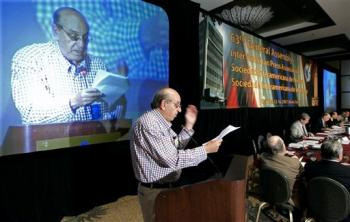 |
 |
 |
 Travel Writers' Resources | October 2007 Travel Writers' Resources | October 2007  
More Attacks on Free Expression Reported
 Laura Wides-Munoz – Associated Press Laura Wides-Munoz – Associated Press
go to original


| | Jorge Hernandez of Colombia speaks on freedom of the press issues in his country Sunday Oct. 14, 2007 during the 63rd General Assembly of the Inter American Press Association in Miami. (AP/David Adame) |
At least 13 employees of media organizations were killed and two disappeared in the past six months in the Western Hemisphere, according to preliminary reports presented Sunday by members of a press association that promotes free expression in the Americas.

The Inter American Press Association said media freedom is increasingly under attack in the Western Hemisphere, especially in countries such as Venezuela and Colombia.

Mexico, meanwhile, has become one of the most dangerous countries in the hemisphere for journalists, said Gonzalo Marroquin, head of the IAPA's committee on press freedom, during the group's 63rd General Assembly in Miami.

"The situation is not improving in general. We are seeing that in some countries it is becoming considerably worse," Marroquin said.

Final reports will be issued Tuesday.

Some advances have been made, the group said. The U.S. House and Senate Judiciary committees have approved bills that would shield reporters from being forced to reveal their sources in federal court. Argentina's Supreme Court ruled a local government could not withdraw advertising from a newspaper simply because of its critical coverage. The Mexican senate decriminalized libel and defamation on a federal level.

But in Mexico, three journalists and three delivery workers were killed, the IAPA reported. Two other reporters disappeared. Journalists in Brazil, Colombia, El Salvador, Haiti, Paraguay, Peru and the United States also were killed. Originally, the IAPA put the number at eight.

In the U.S., police said Oakland Post Editor Chauncey Bailey was killed during his morning walk in August by a man who reportedly told authorities he was concerned about Bailey's investigation into the finances of his employer.

U.S. newspapers cited concern over a federal judge's order that five journalists identify government sources who told them a scientist was a suspect in a series of 2001 anthrax attacks. And they reported the continued detention of Associated Press photographer Bilal Hussein, who has been held in Iraq by the U.S. military since 2006 but has never been charged.

Though the press association focuses on the Western Hemisphere, Iraq has been the world's most dangerous country for journalists in recent years. About 160 journalists and media support workers have been killed there since the war began in March 2003, according to the New York-based Committee to Protect Journalists.

The association's longest and most passionate discussion focused on Venezuela, where, representatives said, the government of Hugo Chavez is slowly muzzling any media outlet critical of the government.

Venezuelan newspapers reported nearly 30 incidents of politically motivated attacks or lawsuits against journalists there in the past six months.

Jose Ocanto, editor of the daily El Impulso, told the AP he is still battling legal and civil defamation cases stemming from a four-year old story on public corruption. After a court initially ruled in his favor, Ocanto was chased through the courthouse by protesters and his car set on fire, he said. In December, a military official threatened to kill him if he did not reveal the name of a photographer who took a picture of the official's daughter carrying his weapon, Ocanto said.

"I am worried because in this hemisphere, there is a lack of awareness of what is happening. Other countries think we are exaggerating the situation," he said.

The situation in Cuba has changed little in the 14 months since President Fidel Castro turned over power to his brother, IAPA members said. At least 27 independent reporters are jailed.

And in the case of Colombia, Humberto Castello, the executive editor of The Miami Herald's Spanish language sister paper, denounced President Alvaro Uribe for accusing the paper's stringer of reporting lies.

Journalist Gonzalo Guillen was already receiving death threats before Uribe's statement. Following the president's accusation — which the paper maintains is unfounded — Colombian authorities rescinded protection of Guillen, and he was forced to flee the country. | 
 | |
 |



